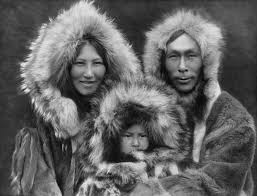Nunavut Post |
||
Online-ZeitungNunavut Post |
-1- |
08.12.2015 |
Interview with Nayati Amaru
NP: Today we have a real expert here. Mr Amaru is professor at the First Nations University of Canada in Regin, Saskatchewan. Good day Mr Amaru. I am very glad that you have come.
Mr. Amaru: I am also very pleased to be here.
NP: We want to get our readers closer to the lifestyle of Canada. Would it be possible to tell us something about the schoolsystem of the First Nations people?
Mr. Amaru: Of course I can do that. But the history of the First Nations people and the schoolsythem is not nice. From 1860 until 1996, the children had to go to residential school. This sytem was launched by the govermmend an the Christian Church. The purpose of it was to keep the children from their culture and integrate them into Canadian society. Over 30% of the First Nations children went to residential schools and didn´t see their families for a long time.
NP: What you told me, really does not sound nice. It must have been very hard to live in these residential schools. What did the children right there?
Mr. Amaru: The teachers have spoken English or French, so the students don´t understand a word. The children were beaten if they speak their native language or did not listen to the teachers. In addition to school, the children also had to work. Usually the children had free time in the afternoon.
NP: And how were the living conditions outside the school?
Mr. Amaru: The living conditions were very bad. In particular, the hygiene and medical care was bad. That's why many children have died. In the end of the 20th century, the last school closed.
NP: In what schools the children went after that?
Mr. Amaru: Today most of the First Nation children go to Indian Survival Schools. The Survival Schools be paid by the state and by private persons. In this schools the children learn to read and write like any other child. But they also learn something about their culture, which is very important for them.
NP: We can see that we have inflicted much suffering to the First Nation people . It is therefore important to help these people today.
Mr. Amaru: You are absolutly right. They are still seriously disadvantaged and we should help them to forget the painful history.
NP: Thank you for the interisting interview Mr Amaru.
Mr. Amaru: Thank you for the invitation.

Native syndicate striked again
New raid in Manitoba
Winnipeg- Last week, the well known gang the native syndikate striked again. The raid took place in the CF Polo Park in the East of Winnipeg. On Monday at 8 am three men with guns attacked a jewellery shop and took the owner as a hostage. After two hours the police freed the owner, who got away with a fright. The syndicate captured jewelry in the amount of 100,000$. Recently the raids of native gangs increased. The crime rate is excessive high. A Reason for that is the high unemployment rate. 63% of the natives in working-age have a job, compared to 76% of the general population. Also the substance abuse is a big problem. To prevent this the government and organisations founded the “National Native Alcohol and Drug Abuse Program“. The program's goal is to help fund First Nations and Inuit-run initiatives.
 Lade Seiteninhalt...
Lade Seiteninhalt...

